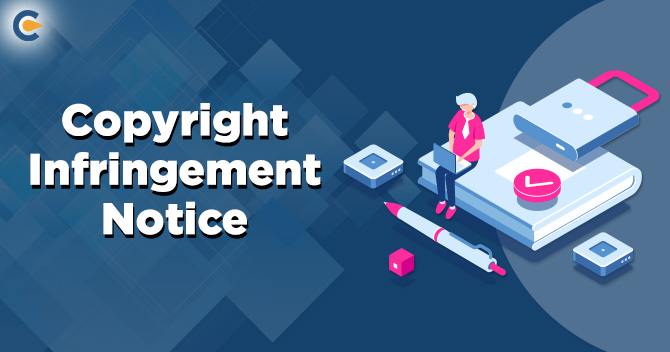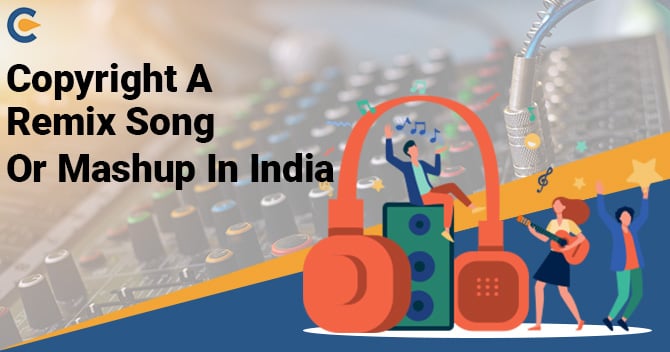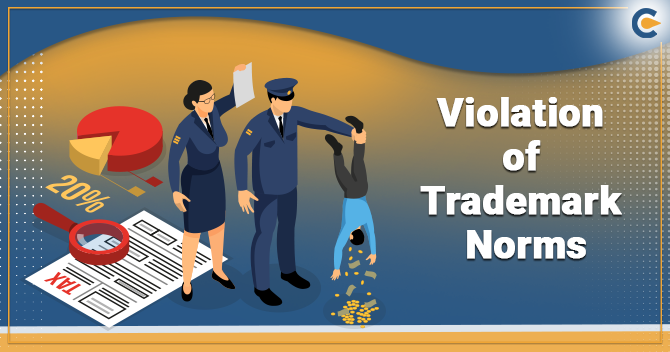As the term suggests, Intellectual Property Rights (IPRs), is a right over the work, which includes human intelligence. Just like other Intellectual Property (IP), a Copyright grants the author or inventor an exclusive right over the work invented by them. Copyright is termed as a ‘bundle of rights’ due to the quality of protecting a varied set of creative and fictional works. The Copyright Act, 1957, under Section 13 provides for the provisions that a person can claim Copyright over original literary, musical, dramatic, and artistic work, cinematograph films, and sound recording. In case if any creator or inventor, after claiming a Copyright on his/her work, finds any kind of illegal use of Copyright by a third party, then he/she can file a Copyright Infringement Notice. In the article, we will discuss how to draft and file a Copy Infringement Notice in India.
What is Copyright Infringement in India?
Copyright Infringement is simply put to protect the use of the artistic work of a creator or an inventor by a third party. Under Copyright Act, 1957, the exclusive right to protect literary and artistic works is given to the holder of the Copyright alone. As per the provisions of Section 18 of the Copyright Act, 1957[1], the holder of Copyright could be an assignee of the Copyright or the creator of the work. A person needs to seek out permission from the holder of Copyright in the form of a license to make use of the work which is protected under the Copyright Act, 1957. For example, the original novelist of a book reserves an exclusive right for the distribution of his/her work, and for such distribution, he/she grant a bookstore the license for the distribution of his/her work. However, if the bookstore fails to acquire a license from the author of the book and, in spite of that, distributes the copies of the books of the author to the public, it will amount to Copyright Infringement.
For understanding Copyright Infringement, it is very important to understand which different exclusive rights are vested with the Copyright holder. The provisions of Section 14 of the Copyright Act, 1957, helps to understand the exclusive rights vested in the Copyright holder.
The different rights vested in Copyright holder are as follows:


Rights in case of literary, musical or dramatic work
- to reproduce the work in any other material form including electronic medium;
- to communicate, perform, or issue copies of the work to the general public;
- adaption and translation of work;
- to make any sound recording or cinematograph film.
Rights in case of computer programme
- to commercially rent or sell a programme of computer;
- to reproduce the work in any other material form including electronic medium;
- to communicate, perform, or issue copies of the work to the general public;
- adaption and translation of work;
- to make any sound recording or cinematograph film.
Rights in case of artistic work
- to replicate the work in any other material form including the storage of work in an electronic medium; or
- the representation of 2-D work as 3-D work and representation of a 3-D work 2-D work.
Rights in case of cinematograph film
- to make a duplicate copy of the film also includes a photograph taken out of the film or storing the photograph in any other medium;
- to commercially rent or sell any duplicate or pirated copy of the film;
- to communicate the film to the common public.
Rights in case of sound recording
- to make any sound recording which includes the original work;
- to commercially rent or sell a pirated or duplicate copy of the sound recording.
The Copyright Law in India has formed a differentiation between acts that qualify as a Copyright Infringement and, on the other hand, the ones that do not qualify as Copyright Infringement, comes under the ambit of the provisions of Sections 51 and 52 respectively, of the Copyright Act, 1957. The Copyright Act, 1957, under Section 51(a) have the provisions related to the ‘acts’ that lead to Infringement of Copyright by means of commercially misusing the Copyright by any other person who has no particular interest in the exclusive right that is granted to the holder of Copyright. Under Section 51 clause (b) of the Copyright Act, 1957 provides for the provisions related to the sale, distribution, import, etc. of infringing copies of the work of the holder of Copyright. Furthermore, Section 52 of the Copyright Act, 1957, provides for provisions related certain ‘acts’ that do not amount to Copyright Infringement, for example, the usage of a work which is protected by Copyright for the purpose of personal use or research does not amount to Infringement of Copyright.
When to File a Copyright Infringement Notice?
Once the holder of Copyright gets to know about Infringement of his/her Copyright by a third party, the immediate and the first thing to be done by the holder of Copyright is to send a Copyright Infringement Notice to the party infringing the Copyright. A Copyright Infringement Notice is just like any other legal notice which comprises the ingredients of a cease and desist Notice. Sending a Copyright Infringement Notice to the infringing party is the very first step that the holder of Copyright could avail before going into any of the available civil or criminal remedies under the Copyright Act, 1957, to the Copyright holder.
A cease and desist Notice, as mentioned above, is a legal notice that forbids a person from doing acts which can violate the lawful right of a certain person. The extent of lawful validity of a notice for cease and desist is that it helps the plaintiff prove in the court of law that there has been a judicious quantity of efforts put in by the plaintiff so as to avoid lawsuit. In the case of Midas Hygiene Industries Pvt. Ltd. and Anr. vs. Sudhir Bhatia and Ors. [2004 (3) SCC 90], theSupreme Court (SC) held that a cease and desist notice acts as a very significant and valuable tool to pronounce injunctions in the court regarding a matter of Infringement of a work. Hence, a cease and desist notice when sent to the infringer of Copyright is considered a vital tool for deciding the cases related to the Infringement of Copyright in favor of the holder of Copyright.
The holder of Copyright, who is affected by a Copyright Infringement, can always take the support of the law to get justice.
The holder of Copyright can send a legal Copyright Infringement Notice to the infringer of Copyright either:
- through a speed post,
- can give it personally to the infringer, or
- can do telegram of the Copyright Infringement Notice.
When the Copyright Infringement Notice be sent to the Infringing Party?
The holder of Copyright can send the Copyright Infringement Notice in the following situations when the holder of Copyright:
- Has certain reasonable grounds to fear that the work of holder of Copyright might get stolen by a third party.
- Has a valid proof that any other person is trying to present the original work of holder of Copyright as their own work.
- Wants to save the work of the holder of Copyright earlier so that no other person can think of infringing the work.
Read our article:License and Assignment of Copyright
What are the Essential Ingredients of a Copyright Infringement Notice in India?
There are certain particulars which are needed to be mentioned in the different legal notices to complete the purpose of the notices. The essential ingredients of a Copyright Infringement Notice are as follows:
- the name of both parties;
- the kind of work protected by the Copyright;
- the date of formation of the work;
- the date when the first publication of work was done;
- then date of Registration of Copyright (if applicable);
- the description of violation of the Copyright;
- the demand of fine with respect to giving compensation to the infringed party;
- the demands with regard to the course of action to be taken by the party whose right is violated by the infringing party with a view to stop the violation of rights of the holder of Copyright;
Below given is a sample draft of a cease and desist Notice for a Copyright Infringement with the required particulars, where M/s KLK have illegally distributed copies of a music video sung and produced by Miss Leela. M/s KLK had not obtained a license from the copyright holder to do so:
Miss Leela,
29-D, Pristine Avenue, Tech Zone-IV, Greater Noida, U.P.
Tel. no. – 8989898989
Email id – missleela@LAgmail.com.
Subject – Cease and Desist letter for Infringement of Copyright.
To,
M/s KLK,
I, Miss Leela, am the sole owner of my sound recording work named “God’s Gift,” which is in the form of a music video, and I hold all the rights of this Copyrighted work. I have written the song on 1st June 2018, and it was first published on YouTube on 1st July 2019. I got my music video registered as a Copyright on 1st July 2018. It has come to my knowledge that your company, M/s KLK, has been making an unauthorized distribution of the copies of my music video. I have not granted or issued a licence to your company for distribution of the copies of my music video and under Section 14 of the Copyright Act, 1957, I as the sole Copyright holder, reserve the right of distribution of my literary or artistic works.
I would like to bring in your notice that, as your act amounts to Copyright Infringement of my lawful rights granted under Section 63 of the Copyright Act, 1957, you could be legally responsible for a fine ranging between Rs.50,000 to Rs. 2,00,000 and also for imprisonment for a term of 6 months, which can be extendable to 3 years.
I hereby, demand that you,
- cease the illegal use of my copyrighted work;
- provide me with a written declaration that you will desist from making any further unlawful use of my work which is copyrighted;
- you will return me back all the copies of my copyrighted work that you hold.
I hope that you understand the consequences of the civil and criminal charges that an Infringement of my lawful right attracts and hope that you will work on the issue expediently. Looking forward to resolve the issue harmoniously, however, I’m prepared to use my rights against such Copyright Infringement, if necessary.
Yours truly,
Miss Leela
What are the advantages and features of Copyright Protection in India?
The advantages and features of Copyright Protection in India are as follows:
- No one can steal or present the work of the Copyright holder;
- The protection of the expression of ideas is done under the Copyright Act, 1957. The idea itself is not protected under the Copyright Act, 1957;
- The original work of a person is only given Copyright protection in India;
- An exclusive right to enjoy the work is granted to the author or creator of the work;
- The author or creator of the work can only decide whether their work can be reproduced or not;
- The computer works should also be treated as literary works under the Copyright Act, 1957;
- Copyright protection is generally given for a period of 60 years;
- The Copyright Infringement Notice can be presented in the court if it is required;
- The trial and adjudication of the offenses committed by any person under Copyright Act, 1957, can be tried by the court inferior or below the rank of a Judicial Magistrate of First Class or Metropolitan Magistrate;
- The 60 years of a Copyright of a literary work will be counted from the year in which the author or creator of work dies;
- The 60 years in works like cinematograph recordings or musical works will be counted from the year in which the works were published;
Conclusion
Although the development of Copyright law in India is recent, but the efforts in providing improved protection of Copyright is visible through the latest amendments in the legislation. Copyright Infringement Notice is a fair means of effort in avoiding lawsuits and settle down the issue of Infringement of Copyright outside the premises of the court. The Copyright Infringement Notice acts as a lawful threat to the parties infringing the Copyright. It also brings to the attention of the parties the legal responsibility that he/she has attracted towards the Copyright holder. The process of drafting and sending the Copyright Infringement Notice is time-consuming and long-lasting. We at Corpbiz have experts who will guide you with the process of Drafting and filing the Notice of Infringement. Our experts will assist you and help you throughout the process of Drafting and sending the Copyright Infringement Notice. Our experts will ensure the successful and timely completion of your work.
Read our article:Copyright Registration in India – Process, Requirements and Duration











